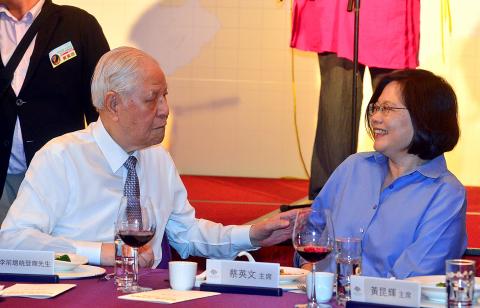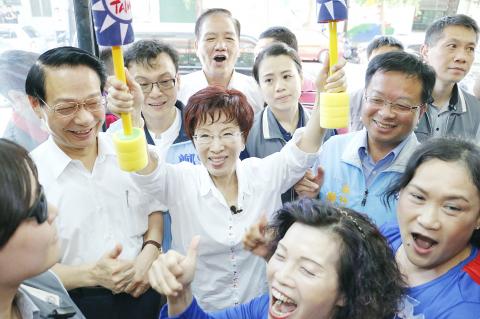Democratic Progressive Party Chairperson Tsai Ing-wen (蔡英文) yesterday urged people to be more understanding and tolerant about issues raised by history, adding that politicians should not use the past to foment conflict and provoke confrontation.
Tsai made the remarks in response to media requests for comment on the controversy sparked by an interview former president Lee Teng-hui (李登輝) gave to a Japanese magazine.
Lee is reported to have said that as Taiwan was then a part of Japan, Taiwanese did not fight Japan in the Second Sino-Japanese War (1937-1945) because at that time, Taiwanese were fighting for Japan, which they viewed as their motherland.

Photo: Wang Yi-sung, Taipei Times
“Each generation and ethnic group in Taiwan has lived a different history, and therefore their memories, experience and interpretations of the past are not the same,” Tsai said yesterday. “When a nation faces such a situation, we have to maintain an attitude of understanding, so that we can learn from history, instead of using what happened as a tool for manipulating rivalry and social division.”
She said that the nation’s tragedy over the past few centuries has been that Taiwanese have been unable to wrest control of the nation’s destiny.
“Now we are a democratic and free nation, and everyone has the right to choose; therefore it is our shared task to defend our freedom and democracy,” Tsai said. “No one should sabotage our freedom and democracy by stirring up rivalry — I believe the public is mature and is capable of facing the issues that history throws up.”

Photo: CNA
However, Chinese Nationalist Party (KMT) presidential candidate Hung Hsiu-chu (洪秀柱) yesterday added to her barrage of attacks on Lee over his comments about Japan, and pressed Tsai to publicly express her stance on the issue.
Responding to Tsai’s remarks that people should view other people’s feelings about their histories with understanding, Hung on Friday night said that she “does not agree with” this kind of statement and questioned whether Tsai would “abandon Lee” if voters began to see a vote for her as a vote for Lee.
In response to Tsai’s comment that it is a tragedy that Taiwanese have been unable to choose their own destinies in the past few hundred years, Hung yesterday said: “It is the misfortune of Taiwanese to be too busy throwing mud and vilifying each other to be able to focus on how to overcome economic hardship and fight together.”
When asked whether her recent criticism of Lee was really an attempt to vilify Tsai, Hung said that as Lee clearly has high expectations of Tsai, Tsai should make clear her relationship with him and explain to the public whether she supports Lee’s ideas.
Hung was particularly fierce when speaking in front of Republic of China veterans on Friday in Hsinchu, lashing out at Lee for “saying Taiwan belongs to Japan as a former president.”
“Are you not pissed off? Do you not hate him?” she asked the veterans.

A magnitude 5.6 earthquake struck off the coast of Yilan County at 12:37pm today, with clear shaking felt across much of northern Taiwan. There were no immediate reports of damage. The epicenter of the quake was 16.9km east-southeast of Yilan County Hall offshore at a depth of 66.8km, Central Weather Administration (CWA) data showed. The maximum intensity registered at a 4 in Yilan County’s Nanao Township (南澳) on Taiwan’s seven-tier scale. Other parts of Yilan, as well as certain areas of Hualien County, Taipei, New Taipei City, Taoyuan, Hsinchu County, Taichung and Miaoli County, recorded intensities of 3. Residents of Yilan County and Taipei received

Taiwan has secured another breakthrough in fruit exports, with jujubes, dragon fruit and lychees approved for shipment to the EU, the Ministry of Agriculture said yesterday. The Animal and Plant Health Inspection Agency on Thursday received formal notification of the approval from the EU, the ministry said, adding that the decision was expected to expand Taiwanese fruit producers’ access to high-end European markets. Taiwan exported 126 tonnes of lychees last year, valued at US$1.48 million, with Japan accounting for 102 tonnes. Other export destinations included New Zealand, Hong Kong, the US and Australia, ministry data showed. Jujube exports totaled 103 tonnes, valued at

TRUST: The KMT said it respected the US’ timing and considerations, and hoped it would continue to honor its commitments to helping Taiwan bolster its defenses and deterrence US President Donald Trump is delaying a multibillion-dollar arms sale to Taiwan to ensure his visit to Beijing is successful, a New York Times report said. The weapons sales package has stalled in the US Department of State, the report said, citing US officials it did not identify. The White House has told agencies not to push forward ahead of Trump’s meeting with Chinese President Xi Jinping (習近平), it said. The two last month held a phone call to discuss trade and geopolitical flashpoints ahead of the summit. Xi raised the Taiwan issue and urged the US to handle arms sales to

BIG SPENDERS: Foreign investors bought the most Taiwan equities since 2005, signaling confidence that an AI boom would continue to benefit chipmakers Taiwan Semiconductor Manufacturing Co’s (TSMC, 台積電) market capitalization swelled to US$2 trillion for the first time following a 4.25 percent rally in its American depositary receipts (ADR) overnight, putting the world’s biggest contract chipmaker sixth on the list of the world’s biggest companies by market capitalization, just behind Amazon.com Inc. The site CompaniesMarketcap.com ranked TSMC ahead of Saudi Aramco and Meta Platforms Inc. The Taiwanese company’s ADRs on Tuesday surged to US$385.75 on the New York Stock Exchange, as strong demand for artificial intelligence (AI) applications led to chip supply constraints and boost revenue growth to record-breaking levels. Each TSMC ADR represents